2007 April
About Andrew Cusack
 Writer, web designer, etc.; born in New York; educated in Argentina, Scotland, and South Africa; now based in London.
Writer, web designer, etc.; born in New York; educated in Argentina, Scotland, and South Africa; now based in London. read more
News
Blogs
Reviews & Periodicals
Arts & Design
World
France
Mitteleuropa
Knickerbockers
Argentina
The Levant
Africa
Cape of Good Hope
Netherlands
Scandinavia
Québec
India
Muscovy
Germany
Academica
The BBC: Can’t they get anything right?
His Imperial Majesty, Haile Selassie I was the Emperor of Ethiopia up to his death at the hands of Communist revolutionaries, so it seems a bit silly to call him the “former Ethiopian Emperor”. More importantly, however, is that he was a devout Christian and was so opposed to Rastafarianism, which considered Haile Selassie to be the Messiah, that he sent Orthodox missionaries to Jamaica in order to convert Rastafarians to Christianity.
For Saint George
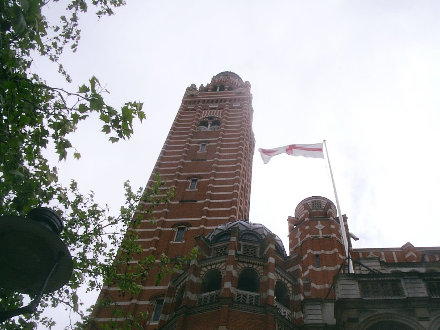
THE CROSS OF SAINT GEORGE snaps proudly from the flagpole above Westminster Cathedral, the Administrator of which, Msgr. Mark Langham, has given us a special St. George’s Day treat by revealing the newly-commissioned designs for completing the mosaic work in that cathedral’s chapel dedicated to the patron saint of England.
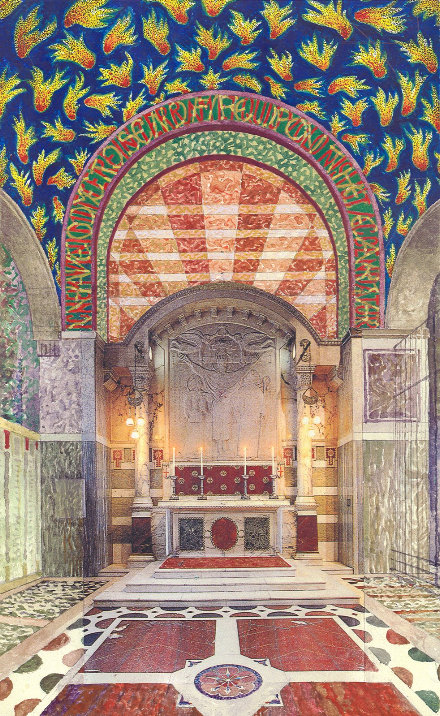
New York Needs a Monarchy
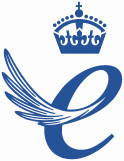 In the business section of today’s New York Sun, of all places, Liz Peek gives us another reason why we need a monarchy. In ‘Why America Needs Its Own Queen’s Award‘, Ms. Peek profiles the Queen’s Award for Enterprise, initiated by Royal Warrant in 1966 as the Queen’s Award for Industry and awarded to British companies for excellence in international trade, innovation, and sustainable development.
In the business section of today’s New York Sun, of all places, Liz Peek gives us another reason why we need a monarchy. In ‘Why America Needs Its Own Queen’s Award‘, Ms. Peek profiles the Queen’s Award for Enterprise, initiated by Royal Warrant in 1966 as the Queen’s Award for Industry and awarded to British companies for excellence in international trade, innovation, and sustainable development.
Of course, Ms. Peek attempts to offer some possible solutions to our detrimental lack of monarchy with regard to this particular aspect, but none of them have quite the appeal of restoring the monarchy. All that would really be necessary would be to pass an amendment removing fourteen words from Article IV, Section 4 of the U.S. Constitution. This is the part that requires the member states of the United States to have republican forms of government. This removal would at least give states the option of becoming monarchies, which is only fair, after all.
Category: Monarchy
A Happy Birthday to Her Majesty
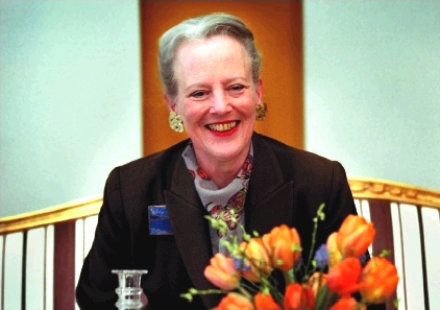

In honour of the anniversary of the birth of Her Majesty Queen Margrethe II of Denmark, I raised a glass of Warre’s (Purveyors to the Household of the Queen of Denmark) this evening. May God bless and keep Her Majesty!
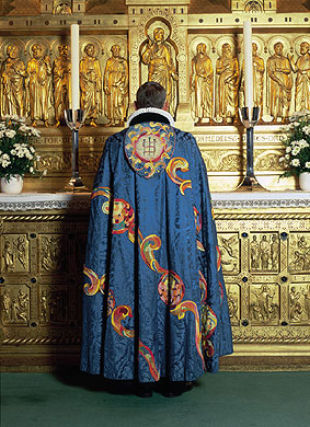
Some of you may recall that Her Majesty is of a somewhat artistic temperment. She sent her sketches inspired by The Lord of the Rings to J.R.R. Tolkein while he was alive, and the author liked them so much he had them published in the Danish edition of the trilogy. Above is an episcopal cope designed by Her Majesty in 1988 for the Cathedral of Viborg.
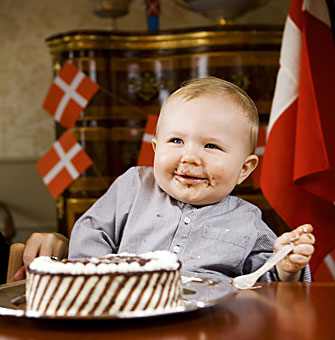
His Royal Highness Prince Christian, the Queen’s grandson and the future King of Denmark.
Naturally, we also wish a very happy birthday and many, many bountiful blessings to another of Christendom’s reigning monarchs: Christ’s vicar and our Holy Father, Pope Benedict XVI, who, it seems, is a reader of Chronicles. God bless our Pope, the great, the good!
Felix Meritis
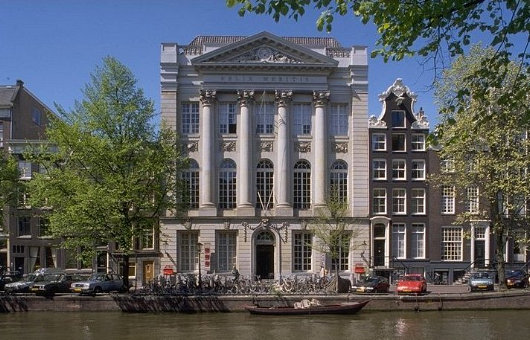
ONE OF MY FAVORITE handsome and dignified, and yet relatively small, buildings is the Felix Meritis on the Keizersgracht in Amsterdam. It has a long and interesting history to accompany the beauty of its design. The ‘Felix Meritis’ was a learned society founded by a number of prominent burghers of Amsterdam in 1777 for the promotion of the arts and sciences in their city. Its name is Latin for ‘fortunate (or more literally, ‘happy’) by merit’. Ten years later, the Felix Meritis purchased four narrow homes on the Keizersgracht and constructed a building, designed by the architect Jacob Otten Husly, on the site. (more…)
The Tragedy of the Falklands War
An article (two versions of which are reproduced here below) recently printed exemplifies one of the tragic aspects of the Falklands War: the Anglo-Argentines who, out of loyalty to their homeland, were forced into waging war against their mother country. The subject of the article, Mr. Alan Craig, happens to be a former student of St. Alban’s College, a fine institution in the Provincia de Buenos Aires (currently celebrating its centenary) which I had the great privilege of briefly attending. (C.f. How Andrew Cusack Became a Tea Drinker). Another sad aspect of the Falklands War is that if there are any two nations which should enjoy the bonds of friendship, it is Britain and Argentina. It is a shame when two countries which should be natural companions, perhaps allies, have deep-seated and long-lasting emotions in the way. (One thinks of Germany and Poland in particular).
Interestingly, Argentine textbooks contain maps of the Falkland Islands in which all the towns and geographical features have contrived names en Castellano. Port Stanley, for example, is called Puerto Argentino, while the Falklands themselves are known to Argentines as las Malvinas.
I remember one day in geography class at St. Alban’s, exhibiting the typical brash arrogance of a youthful Anglo-Saxon, raising my hand, being called on by the teacher, and pronouncing “Sir, I have studied geography all my life, and I spend a lot of time reading maps. I don’t believe there exists such a place called ‘the Malvinas’ though the Falklands…”. I was going to continue that the Falklands “are roughly the shame shape and size and in the same place as this map depicts” (or something to that effect) but I had been interrupted by such a hail of paper, pens, and whatever moveable objects my fellow students could get their hands on (I think Nico, that Russian bastard, had actually thrown a book) that I found it more prudent to take cover underneath my desk rather than continue upon the particular oratorical course upon which I had embarked.
Nonetheless, we pray eternal rest to all the soldiers who fell on those windy isles a quarter-century ago, and that those who survived will live in the peace which their sacrifice has earned for them.
Flags of the British Nations
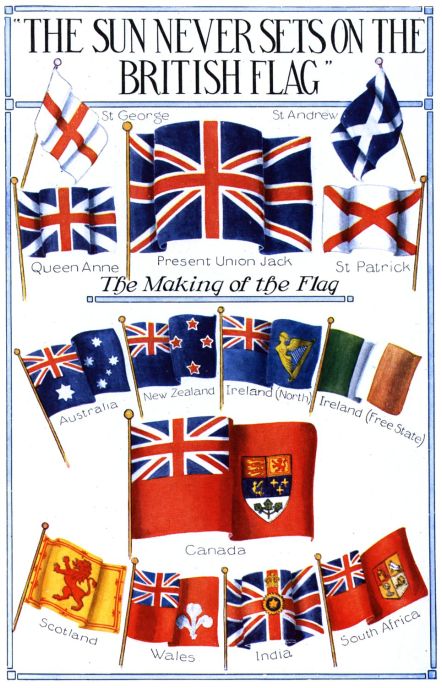
It is interesting how little-valued accuracy was in the depiction of flags “back in the day”. In this illustration, for example, the flags of Wales and “Ireland (North)” are mere inventions while the Scottish and Indian ones are arguable yet imprecise.
The “Welsh” flag depicted is a red ensign that is defaced with the three feathers of the Prince of Wales.
The “Ireland (North)” flag is handsome, but nonexistent. Northern Ireland had an official flag in use from 1953 until the Parliament of Northern Ireland was prorogued in 1972. (It was never recalled, and has since been superseded by the Northern Ireland Assembly). The flag of “Norn Iron” was a banner of the province’s coat of arms.
The flag of Scotland shown here is not actually the national flag (depicted above as the “St. Andrew” flag) but rather the Scottish royal standard, which is often (and improperly) used as an alternative national flag.
The Indian flag depicted is actually the flag of the Viceroy of India, which (admittedly) was sometimes used as a national flag for India. More often, however, a blue or red ensign was used, defaced with the Star of India.
The Canadian flag depicted here was changed in 1957, when the arms of Canada were themselves changed. The maple leaves in the bottom compartment of the sheild were specified to be “gules” (red). Up to that point, they had previously almost always been rendered “vert” (green). The Canadian flag itself was very controversially and unpopularly replaced by Prime Minister Lester B. Pearson with the Maple Leaf Flag. The Leader of the Opposition, the Rt. Hon. John Diefenbaker, derided the Liberal premier’s decision:
“We have had a flag. Flags can be changed. But flags cannot be imposed — the sacred symbols of a people’s hopes and aspirations — by the simple capricious personal choice of a prime minister of Canada. Now then, whenever the overwhelming majority of Canadian people want a new version, and when the design is meaningful and acceptable to most Canadians, that’s democracy. … I asked him [Prime Minister Pearson] this question: as to whether or not, under the circumstance, he would permit or he would arrange for a national referendum and his answer was no.”
Search
Instagram: @andcusack
Click here for my Instagram photos.Most Recent Posts
- Katalin Bánffy-Jelen, R.I.P. March 3, 2025
- Substack Cusackiensis March 3, 2025
- In the Courts of the Lord February 13, 2025
- American Exuberant February 10, 2025
- Crux Alba Journal Launch February 10, 2025
Most Recent Comments
Book Wishlist
Monthly Archives
Categories


